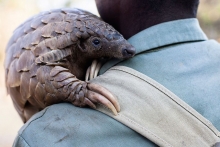Four species of pangolin are native across Asia, but due to trafficking, they’re now listed as endangered or critically endangered. As Asian numbers have dwindled, traders have turned their gaze to the four other pangolin species that live in central and southern Africa. They’ve been under increased threat from traffickers.
The transnational nature of wildlife trafficking, coupled with demand, can wipe out a species in a heartbeat,” said Sam Wasser, director of the University of Washington’s Center For Conservation Biology.
Wasser and graduate student Hyeon Jeong Kim have developed DNA analysis tools so law enforcement can trace where pangolins are being poached. Such tracking can crack down on countries violating the new guidelines and may be key to enforcing the CITES agreement.
Wasser said protecting the pangolin, which plays a key role in the ecosystem as an ant and termite-eater, will preserve biodiversity. But he said disrupting the routes of pangolin traffickers could stop other criminal activity.
“These transnational criminals are not just dealing with pangolins,” he said. “They’re dealing with ivory. They’re dealing with cocaine. They’re dealing with heroin. They’re dealing with human trafficking.”
Read the full article in PBS Newshour.

